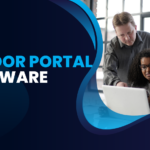Choosing the right Web Portal Software
Why do you need a Web Portal?
Having a robust online presence is crucial for businesses of all sizes. One of the most effective ways to achieve this is through a well-designed web portal. A web portal serves as a gateway to your business, providing a centralised platform for customers, employees, and partners to access information, services, and resources. However, with numerous options available in the market, choosing the right web portal for your business can be a daunting task. This comprehensive guide will walk you through the essential steps and considerations to help you make an informed decision.
1. Assessing Business Needs
Before diving into the world of web portals, it's crucial to have a clear understanding of your business needs. This assessment will serve as the foundation for your decision-making process and help you narrow down your options.
Identify Your Objectives:
Start by defining the primary goals you want to achieve with your web portal. Are you looking to improve customer engagement, streamline internal processes, or enhance collaboration among team members? Having a clear set of strategic business objectives will guide your selection process and ensure that the chosen portal aligns with your business strategy.
Analyse Your Target Audience:
Consider who will be using the web portal. Will it be primarily for customers, employees, partners, or a combination of these groups? Understanding your audience's needs, preferences, and technical proficiency will help you choose a portal with the right features and user interface.
Evaluate Current Systems:
Take stock of your existing IT infrastructure and business applications. The ideal web portal should integrate seamlessly with your current systems, such as customer relationship management (CRM) software, enterprise resource planning (ERP) tools, and content management systems (CMS).
Determine Scalability Requirements:
Consider your business's growth trajectory and future needs. Choose a web portal solution that can scale with your business, accommodating increased users, data, and functionality as your business requirements expand.
Assess Security Needs:
Evaluate the sensitivity of the information that will be stored and shared through the portal. Identify any industry-specific regulations or compliance requirements that your portal must adhere to, such as GDPR, or PCI DSS.
2. Comparing Different Web Portal Solutions
Once you have a clear understanding of your business needs, it's time to explore the various web portal solutions available in the market. Here are some key types to consider:
Off-the-Shelf Solutions:
These are pre-built portals that offer a range of features and can be quickly implemented. They are often more cost-effective and require less technical expertise to set up. However, they may have limitations in terms of customisation and scalability.
Custom-Built Portals:
Tailored specifically to your business needs, custom-built portals offer maximum flexibility and scalability. While they require a higher initial investment and longer development time, they can provide a perfect fit for complex or unique business requirements.
Open-Source Platforms:
These solutions provide the source code for free, allowing for extensive customisation. They often have active communities that contribute to ongoing development and support. However, they may require more technical expertise to implement and maintain.
Cloud-Based Portals:
Hosted on remote servers, cloud-based portals offer flexibility, scalability, and reduced IT infrastructure costs. They typically provide regular updates and maintenance, but may have limitations in terms of customisation and data control.
Hybrid Solutions:
These combine elements of off-the-shelf and custom-built portals, offering a balance between customisation and quick implementation. They can be a good middle ground for businesses with specific needs but limited resources.
When comparing these solutions, consider factors such as:
- Total cost of ownership (including licensing, implementation, maintenance, and support)
- Ease of implementation and time to market
- Flexibility and customisation options
- Scalability and performance
- Integration capabilities with existing systems
- Vendor reputation and support services
3. Key Features to Consider
As you evaluate different web portal solutions, pay close attention to the following key features that can significantly impact your portal's effectiveness:
User Experience (UX) and Interface Design:
A well-designed, intuitive interface is crucial for user adoption, satisfaction and user experience (UX). Look for portals that offer responsive design, customisable layouts, and accessibility features to ensure a seamless experience across devices and user groups.
Content Management System (CMS):
An efficient CMS allows for easy creation, organisation, and distribution of content. Look for features like version control, workflow management, and multi-language support to streamline your content processes.
Search Functionality:
Advanced search capabilities, including filters and faceted search, can greatly enhance user experience and productivity. Consider portals that offer full-text search, relevance ranking, and the ability to search across multiple data sources.
Personalisation and Customisation:
The ability to tailor the portal experience to individual users or groups can significantly improve engagement and efficiency. Look for features like personalised dashboards, customisable widgets, and role-based access controls.
Collaboration Tools:
Features such as document sharing, discussion forums, and project management tools can enhance teamwork and communication within your organisation.
Analytics and Reporting:
Built-in analytics capabilities can provide valuable insights into user behaviour, content performance, and overall portal usage. Look for solutions that offer customisable dashboards and reporting tools.
Security and Access Control:
Robust security features are essential to protect sensitive information. Consider features like single sign-on (SSO), multi-factor authentication, and granular access controls.
Web Portal Integration Capabilities:
The ability to integrate with your existing business systems and third-party applications is crucial for creating a unified digital experience. Look for portals with robust APIs and pre-built connectors to popular business applications.
Mobile Accessibility:
With the increasing use of mobile devices, ensure that the portal offers a responsive design or dedicated mobile apps for on-the-go access.
Scalability and Performance:
Choose a portal that can handle your expected user load and grow with your business. Consider features like load balancing, caching mechanisms, and content delivery networks (CDNs) to ensure optimal performance.
4. Decision-Making Tips
With a clear understanding of your needs and the available options, use these tips to make your final decision:
Conduct a Proof of Concept:
Before committing to a particular solution, run a small-scale pilot project to test its functionality and fit with your business processes. This can help identify potential issues and confirm that the portal meets your requirements.
Involve Key Stakeholders:
Include representatives from different departments in the decision-making process. Their input can provide valuable insights into specific needs and potential challenges.
Consider Total Cost of Ownership:
Look beyond the initial purchase price and consider long-term costs such as licensing fees, maintenance, upgrades, and support. A solution that seems expensive upfront may prove more cost-effective in the long run.
Evaluate Vendor Support and Community:
Research the level of support provided by the vendor, including documentation, training resources, and technical assistance. For open-source solutions, assess the activity and responsiveness of the community.
Plan for Future Growth:
Choose a solution that not only meets your current needs but also has the potential to accommodate future requirements. Consider the vendor's roadmap and commitment to ongoing development.
Check for Compliance:
Ensure that the chosen portal solution complies with relevant industry regulations and data protection laws. This is particularly important for businesses in highly regulated sectors.
Read User Reviews and Case Studies:
Look for feedback from businesses similar to yours that have implemented the portal solutions you're considering. Their experiences can provide valuable insights into real-world performance and challenges. You could even ask to speak directly to an existing customer to gain even more insights.
Consider Implementation Time:
Factor in the time required for implementation, customisation, and user training. If you need a quick deployment, an off-the-shelf or cloud-based solution might be more suitable.
Assess the Learning Curve:
Consider the technical expertise required to manage and maintain the portal. If your IT resources are limited, a solution with a user-friendly administration interface may be preferable.
Don't Overlook User Adoption:
The success of your web portal ultimately depends on user adoption. Choose a solution that offers an intuitive interface and features that will encourage users to engage with the platform regularly.
Choosing the right web portal for your business is a critical decision
In conclusion, choosing the right web portal for your business is a critical decision that can significantly impact business efficiency, collaboration, and customer engagement. By thoroughly assessing your business needs, comparing different solutions, focusing on key features, and following these decision-making tips, you can select a web portal that not only meets your current requirements but also supports your long-term business goals.
Remember that the process of implementing a web portal doesn't end with the selection. Proper planning, customisation, and ongoing maintenance are essential to ensure that your portal continues to deliver value over time. Regularly gather feedback from users and be prepared to make adjustments as your business evolves.
By taking a thoughtful, strategic approach to choosing and implementing your web portal, you can create a powerful digital platform that drives growth, enhances productivity, and provides a seamless experience for all stakeholders in your business ecosystem.
Here at Applications Platform we provide you with market-proven web portal development services that have been tried and tested in a wide range of B2B business scenarios. Our enterprise-level web portal solutions are fully integrated with your existing business systems, powered by low-code technology and are feature rich with the required web portal features to streamline processes and enhance customer satisfaction.
Our Professional Services team helps you to simplify the portal development process including planning, development, customisation and deployment to help you go to market quickly, on time and within budget.
If you’re looking to transform your business through B2B portal software, download the datasheet below or call us on +44 (0) 330 99 800 50.

